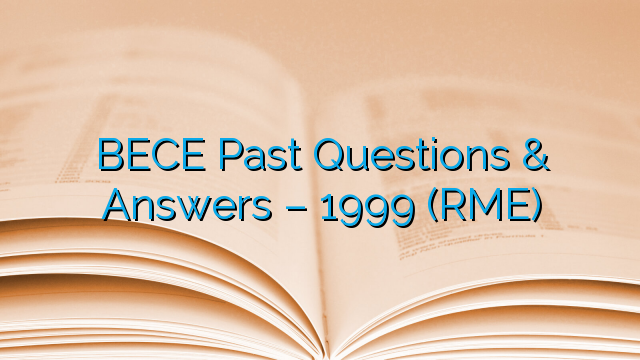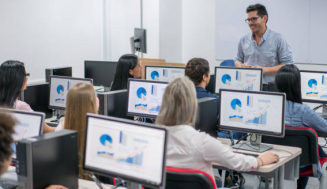BECE Past Questions & Answers – 1999 (RME)

April1999
RELIGIOUSANDMORALEDUCATION
SECTIONB ESSAY
1 hour
Answer threequestionsonlyfrom this section, choosingonequestion from eachpart
Creditwill be given for clarity of expression and orderlypresentation ofmaterial
PART I RELIGION
Answer onequestion onlyfrom this part
1. (a) (b) Statefive things created byGod
Explain the usefulness of anythreeof them to mankind.
2.
(a) (b)
Describethe earlylifeof Prophet Mohammed
Indicate threemoral lessons that can belearnt from his life.
3.
(a) (b)
Describethetraditional festival celebrated inyourcommunity. Listthreereasons whythe festival is celebrated.
PART II MORAL LIFE
Answer onequestion onlyfrom this part
4. (a) Mention threeschool rules and threeregulations at home
(b)
Whyare rules andregulations important?
5. Describefive ways that one can showgood manners
6. (a) Statethe stages onehas to pass through to showrepentance
(b)
Whyis repentancenecessary?
PART III SOCIAL LIFE
Answer onequestion onlyfrom this part.
7. (a) (b) Explain the nuclear familysystem
Statethe obligations of each member of thefamily
8.
(a) (b)
What areReligious Youth Organisations?
Mention anyfive functions of suchyouth organisations inyour community CLICK TO VIEW ANSWERS TO PART 2
RELIGIOUSANDMORALEDUCATION SOLUTIONS SECTIONB
ESSAY
1. (a) Things created by God
(i) Air
(ii) Rainfall (iii) Plants (iv) Earth
(v) Waterbodies
(vi) Animals (vii) Stars (viii)Moon
(b) Theusefulness ofany threeofthemtomankind.
CREATION USEFULNESS
Air (i) For respiration in man
(ii)Plantsuseit for photosynthesisto providefood for man
(iii)Used forventilation
(iv)For burningofmaterials
(v)For transportation bysail boats
Rainfall
(i) Softenstheground for easyploughingand sowing
(ii) Makesplantsgrow well
(iii) Provides water for domesticuse(bathing, washing, etc) (iv) Provides water for irrigation of farms
(v) Makestheweathercooler for greatercomfort
(vi) Supplies water toincreasethevolumeofwaterbodies
Plants i) Several plantsprovidefood for animalsand humankind
ii) Someplantscan beused asherbsor for medicine
iii) Certain plants(trees/ timber) areused for furniture and buildingmaterials
iv) Plants(trees) serve as windbreaksthat reducethe destructiveimpact ofstrongwinds
v) Green plantsreleaseoxygen (used for respiration) into
theatmosphereasaresultofphotosynthesis
vi) Green plants help to reducethecarbon dioxide concentrationin theatmospherebyabsorbingit for photosynthesis
vii) Certain plantsareusedtocheck erosion viii)Someplants(trees) provideshade
ix) Someplantsareworshipped asdeitiesincertain traditional societies
x) Someplants(eg, grass, plants with flowers, hedges, trees)aregrown to beautifyaplace.
xi) Certain partsof/substancesfromsomeplantscan be used to makevariousitems such asadhesives, fabric, brooms, footwear,etc
xii) Partsofcertain plantsareused to provide fuel, suchas firewood and charcoal
Thesea/ ocean (i) It isasourceof food (seafood) for man andanimals
(ii) It isasourceofwater fordomesticpurposes such as bathingand washing
(iii) It isused for theproduction ofcommon salt
(iv) It isameansoftransport(usingboats, ships, submarines, etc)
(v) Crudeoil isdrilled frombelowtheseabed
(vi) It providesemployment for peoplesuchasfishermen, sailors, portworkers, etc
(vii) It helpsin rain formationaslargeamountsofwater get evaporated into the atmosphere
Animals (i) For transportation, eg, camels, horses, donkeys, etc
(ii) Forfood, eg, chicken, sheep, cattle,etc
(iii) For sports/ entertainment,eg, horses, bulls
(iv) For working, such asploughing, eg, oxen, bulls
(v) For protection,eg, dogs
(vi) For pleasure/ touristattraction,(zoo animals, wildlife)
Stars (i) Theygivelight to theearth
(ii) Thesun (a star) providesenergy for life activitieson earth
(iii) Starscan beused for navigation
(iv) Starscan beusedto telltimesand seasons
(v) Starsareused inmanyculturesand religionsfor predictions, prayer and asadeity
Moon (i) It giveslight to theearth duringthenight
(ii) It causestherisingand fallingofseatides
(iii) It can beusedto determinetimesand seasons
(iv) It isused bycertainculturesand religionsfor predictions, prayer and asadeity
(v) It hasbeen usedin manyworksofart, includingin national flags, emblems, etc
2. (a) The early lifeofProphet Mohammed
Prophet Mohammed wasbornon 20th April, 571 ADin Mecca, Arabia
His fatherwas calledAbdullah, and his mother, Amina
His fatherdied beforehewas born
From age1-5, awomannamed Halima took care ofhim
She returned himto his mother, who also died after ayear, when Mohammed was 6years old
Hewas then taken careof byhisgrandfather, Abdul Mutalib, who also died 2years later, when Mohammed was 8 years old.
Abu Talib, Mohammed‟suncle, then looked afterhim.
Hetook Mohammed alongon oneof his business trips to Syria.
When Mohammed was 12years, therewasaprophecythat hewillbeagreat person in future.
Actingon theadvicefrom amonk, Abu Talib took Mohammed back to Arabia from
Syria
Throughout his childhood, Mohammed was perceived to beveryhardworking, prayerful, loyal, humble, peace-lovingand honest.
Mohammed workedforarich widow called Khadijah, whom he latermarried whenhe was 25years old.
(b) Moral lessons that can belearnt fromhis life.
(i) Hard work / diligence
(ii) prayerfulness
(iii)loyalty
(iv)humility
(v) peacefulness
(vi)honesty
3. (a) The traditional festivalcelebratedinyour community.
PS:Inthisquestion, thestudent isexpected tonameaparticular festival, (eg,Homowoof the
(b) Gas,Hogbetsotsoof the Anlos,Adaekeseof theAsantes) anddescribethat named festival
Thefollowing are thereasonswhy most festivals are celebrated
(i) NEWYEAR-Festivalsare celebratedtomarkthebeginningofanewyear
(ii) THANKSGIVINGANDPRAYER– To thank theSupremeBeing, lesser godsand ancestorsfor asuccessful past year and prayfor their blessingsin thecomingyear.
(iii) PURIFICATION – To purifythe ancestral stools,thepeopleand theland.
(iv) REMEMBRANCE– To rememberandcelebratethelivesand worksofpast leaders
(both religiousand traditional)and rulers
(v) PASTDELIVERANCE– To commemoratepast victoriesover hunger, oppression, disease,etc.
(vi) HOMAGE/ HONOUR–To payhomageto (or honour) thechiefand renewloyaltyto the chiefbysub-chiefsand subjects:
(vii) FAMILYREUNION– To bring variousfamilymemberstogether andrenew relationshipsafter longperiodsofseparation
(viii) CONFLICT RESOLUTION – To settlefamily/ communal conflictsand litigationsand chartanewcoursefor futurerelationship:
(ix) DEVELOPMENT– To plan andimplement developmental projects
(x) FUND-RAISING – To raisefundsto supportvarious socio-economicprogrammes.
(xi) TOURISM – To attract touristsintothecommunity.Tourism helpstosupportthe artsand craftsindustryand raiseforeign exchangefor the country
(xii) CULTURALPRESERVATION– To preservetheindigenousculture/ traditionsand thereforeprevent it fromdyingout.
4. (a) School rules
(i) Come to school beforethestipulated arrival time (eg, 7:00am) (ii) Doyour school chores diligently
(iii) Attend morningassemblyandallotherschoolgatheringsregularlyand punctually. (iv) Greet andrespect allteachers and school mates
(v) Payattention in class
(vi) Do and submityourclassand home work on time (vii) Ensurethatyour surroundingis always kept clean (viii) Wear the required uniform at alltimes
(ix) Dress modestlyand decently
(x) Assist /help others whenever theyneed help.
(xi) Obeygood instructions from teachers and seniors
(xii) Raiseyour hand andwaitto be called to answer orask a question
(xiii) Payattention duringlessons
(xiv) Takepart in allclassroom activities
(xv) Respect theviews of others
(xvi) Greet theteacher andyour classmates whenyou enterthe classroom
(xvii) Do not leavetheclassroom without permission
(xviii)Do not stand on the tables and chairs except bypermission
(xix) Do not litter the classroom or school compound
(xx) Do not makenoise in class
(xxi) Do not fight in class (or anywhere) (xxii) Do not eat in class
(xxiii)Do not sleep in class
Regulations at home
(i) Washyour faceand brushyour teeth after waking up (ii) Say yours prayers and read the scriptureseveryday (iii) Lay your bedafterwakingup
(iv) Greet whoeveryou meetforthe first time
(v) Doyour house chores everyday
(vi) Do not use abusivelanguage
(vii) Use electricitywisely/ do not leave electricalgadgets on withoutusingthem
(viii) Usewater wisely/ do notmisuse water/ do notleavethe tap running
(b) Why rules andregulations areimportant
(i) Theyhelp to maintain order
(ii) Theyinstilldiscipline in people
(iii) Theypromote peaceful coexistence (iv) Theycreatean atmosphereof security (v) Theyencourageresponsible behavior
(vi) Theyhelp to cultivatetolerancein people
(vii) Theymaketeachingandlearningeasier and moreeffective
(viii) Theyhelp to improve thestandard ofthat community (ix) Theyhelp to protect one‟s fundamental human rights (x) Theyhelp to protect lifeand property
5. Ways inwhichone canshowgoodmanners
(i) Greetingandrespecting others
(ii) Helpingtheelderlywiththeirload
(iii) Offeringone‟sseat to the elderly
(iv) Puttingone‟shands behind him/ herwhen speakingwith the elderly
(v) Usingpolite language, such as „please‟,„thankyou‟and „sorry‟when speakingto
others
(vi) Usingthe proper modesofgreeting, suchremovingone‟shat, usingthe right hand,
lowering one‟scloth / bowingbeforea chief, etc (vii) Doingone‟sschool chores diligentlyand faithfully (viii) Dressingmodestlyand decently
(ix) Avoidingallforms of social vices, suchas prostitution, drugabuse, armedrobbery, etc.
(x) Exercisingself-control over one‟sdesires or temper (xi) Assisting/ helpingfriends whenever theyneed help. (xii) Doingone‟shouse chores diligentlyand faithfully (xiii) Obeying good instructions from elderlypeople
(xiv) Disposingof litterin a proper way
(xv) Keepingour bodiesand surroundingscleanand tidyatalltimes
6. (a) Stages onehas to pass throughto showrepentance
(i) Admitting/ Confessing/Acceptingthat onehas sinned or donewrong
(ii) Showingregret forthesin /wrong committed (iii) Askingfor forgiveness from theoffended person (iv) Ensuringthat the sin /wrongis not repeated
(b) Why repentanceis necessary
(i) It shows that oneis trulysorryforhis /her sins /wrongs. (ii) It enables oneto be forgiven and shown mercy
(iii) It makes room forreconciliation (comingback together) (iv) It shows that oneis reasonable andwise.
7. (a) Thenuclearfamily system
– This familysystem comprises the father, motherand children.
– Thehead of the familyisthe father
– The assistant head of thefamilyis themother
– The father is responsibleforthe provision of essential needs of thefamily
– Thesizeis relativelysmall
(b) Obligations oftheFather
(i) Heserves as thehead of the family
(ii) Heprovides for thebasicneeds, such as,food, clothingand shelter
(iii) Hepays the schoolfees of the children
(iv) Hepays the homebills
(v) Heusuallyprovides spiritual and careerguidanceforthe family
(vi) Hesupplies the educational, health and recreational needs of thechildren
(vii) Hemanages the affairs of thehome togetherwith mother
Obligations ofthe Mother
(i) She assiststhe fatherto head the home
(ii) She assiststhe fatherto providebasic needs, suchas, food, clothing and shelter
(iii) She assiststhe fathertomanagetheaffairs ofthehome
(iv) Sheusuallydoes the shoppingforfoodstuffs,groceriesand otheritems
(v) Shesupervises the household chores in thehome
(vi) Sheusuallyprovides moral and emotional supportforthe family. (vii) She assiststo supplytheneeds and wants of the children
(viii) Shesupervises the provision of food in thehome
Obligationsofa childin thehome
(i) Obeying and respectingtheparents (ii) Sweeping rooms and thecompound (iii) Tidyingup rooms and the compound (iv) Fetchingwater
(v) Helpingwith cooking
(vi) Layingthe table
(vii) Washingdishes, clothes,etc
(viii) Taking careofyounger children
(ix) Runningerrands forparents and oldersiblings
8. (a) Religious Youth Organizations
Groups madeup ofyoungpeoplein the religiousbodies. Theyare established mainlyto train
them to uphold the doctrines, values and principles of the religious bodies.
(b)
Functionsofyouthorganizations inthe community
(i) To promotepeace, love and harmonyamongpeople
(ii) To educate thememberson the foundation and historical background oftheir religion
(iii) To teach members theprinciples, values anddoctrines ofthe religion
(iv) To help members togrow spiritually
(v) To support theneedyandunderprivileged in society
(vi) To help with seculareducation (both formal and informal)ofpeople
(vii) To create theopportunityformembers to discoverand develop their talents and potentials
(viii) To give members theopportunityto socializein a healthyenvironment
(ix) To help member to keeptheirphysical bodies fit and strong
(x) To create theopportunityformembers to learn vocational and other practical skills which could be ofcommercial value
(xi) To train members to become futureleaders
(xii) To give members the chanceto exploreotherplaces outside theirlocalities






